
I recently spoke with journalist and author, Denver Nicks, about his upcoming book, Private: Bradley Manning, WikiLeaks, and the Biggest Exposure of Official Secrets in American History. Nicks says that he has an agreement with one of his sources to publish the book after the verdict, and that it contains previously undisclosed chat logs. You can find Denver Nicks on Twitter @DenverNicks



Below is a March 1, 2012 United States Department of Defense Press Release for an upcoming Motion Hearing in the legal proceedings for U.S. Government vs. PFC Bradley Manning:
Classification: UNCLASSIFIED
Caveats: NONE
NEWS RELEASE
The U.S. Army Military District of Washington
Guardians of the Nation’s Capital
FOR IMMEDIATE RELEASE#12-06
DATE: March 1, 2012
U.S. GOVERNMENT VS. PFC BRADLEY MANNING MOTION HEARING SCHEDULED
FORT LESLEY J. MCNAIR, D.C. – The military judge has scheduled a motion hearing in the case of United States vs. Pfc. Bradley E. Manning, beginning on Thursday, March 15 at 10 a.m., at Fort George G. Meade, Md.
Pfc. Manning is charged with aiding the enemy; wrongfully causing intelligence to be published on the internet knowing that it is accessible to the enemy; theft of public property or records; transmitting defense information; fraud and related activity in connection with computers; and for violating Army Regulations 25-2 “Information Assurance” and 380-5 “Department of the Army Information Security Program.”
If convicted of all charges, Manning would face a maximum punishment of reduction to the lowest enlisted pay grade, E-1; total forfeiture of all pay and allowances; confinement for life; and a dishonorable discharge.
Media queries and information on credentialing for the arraignment may be emailed to the U.S. Army Military District of Washington Public Affairs Office at mediadesk@jfhqncr.northcom.mil.
-30-
Classification: UNCLASSIFIED
Caveats: NONE




Authored By: Nikolas Kozloff
I have always been a bit skeptical about some of the more salacious claims made in John Perkins’ Confessions of an Economic Hit Man, the story of one man’s life working for the secretive National Security Agency or NSA. When he was a young man, NSA interrogators interviewed Perkins and explored his “frustration about the lack of women, sex, and money.” Perkins’ fit the NSA’s psychological profile, and after being accepted into the organization’s shadowy ranks, he landed a corporate job working as an economist with a major consulting firm. It was all a cover, however, for Perkins’ real purpose: as a self-described “economic hit man,” the youth was dispatched to poor Latin American countries such as Panama and Ecuador where he was tasked with cheating governments out of money and funneling cash from the coffers of the World Bank into the hands of major corporations and wealthy elites.
No doubt, U.S. intelligence agencies partake in such activities all the time, yet some of Perkins’ stories strained my credibility. For example, the author discusses a mysterious woman “consultant” at his firm named Claudine who came to be the young man’s teacher. “My assignment is to mold you into an economic hit man,” she tells Perkins. “No one can know about your involvement --- not even your wife.”
Later, Perkins remarks of Claudine, “Beautiful and intelligent, she was highly effective; she understood my weaknesses and used them to her greatest advantage.” “Her approach,” Perkins wrote, was a “combination of physical seduction and verbal manipulation.” The author adds, “My time with Claudine already represented the realization of one of my fantasies; it seemed too good to be true.”
From Claudine to Stratfor’s Modest Analyst
When Senegal's President Abdoulaye Wade was booed by hundreds of voters as he cast his ballot Sunday in an election the controversial incumbent hopes will elect him to serve a third term in office, it capped more than a month of popular protests by opposition candidates and their supporters against what many have called a "constitutional coup" by supporters of the corrupt regime.


On the 27th of February 2012, Wikileaks released the following statement:
"LONDON—Today, Monday 27 February, WikiLeaks began publishing The Global Intelligence Files – more than five million emails from the Texas-headquartered "global intelligence" company Stratfor. The emails date from between July 2004 and late December 2011. They reveal the inner workings of a company that fronts as an intelligence publisher, but provides confidential intelligence services to large corporations, such as Bhopal’s Dow Chemical Co., Lockheed Martin, Northrop Grumman, Raytheon and government agencies, including the US Department of Homeland Security, the US Marines and the US Defense Intelligence Agency. The emails show Stratfor’s web of informers, pay-off structure, payment-laundering techniques and psychological methods, for example:
"[Y]ou have to take control of him. Control means financial, sexual or psychological control... This is intended to start our conversation on your next phase" – CEO George Friedman to Stratfor analyst Reva Bhalla on 6 December 2011, on how to exploit an Israeli intelligence informant providing information on the medical condition of the President of Venezuala, Hugo Chavez.

For in-depth coverage of the arraignment, see Alexa O'Brien's transcript and Kevin Gosztola's live-blog.
(Links for further coverage available at the end of this update.)
This transcript was taken by hand at Bradley Manning's arraignment on February 23, 2012 at 1:00 p.m., Fort Meade, MD.
Please send corrections to carwinb@hushmail.com.
Bradley Manning's arraignment was held in same court room as his Article 32 Pretrial Hearing. You can read transcripts from the first three days of that proceeding.
The courtroom for Bradley Manning's arraignment is lit dramatically with incandescent parabolic reflectors, and not fluorescent lights as was his Article 32 Pretrial Hearing.
Military personnel are dressed in full armed service uniforms. They had worn camos during the Article 32 Pretrial Hearing.
Many of the same individuals from the Article 32 Pretrial Hearing, like Lt. Hughes, are guarding the arraignment proceeding.
I went as a member of the public, even though WL Central was considered a credential media organization by the Pentagon "for this hearing." I did so, because I wanted to be in the courtroom.
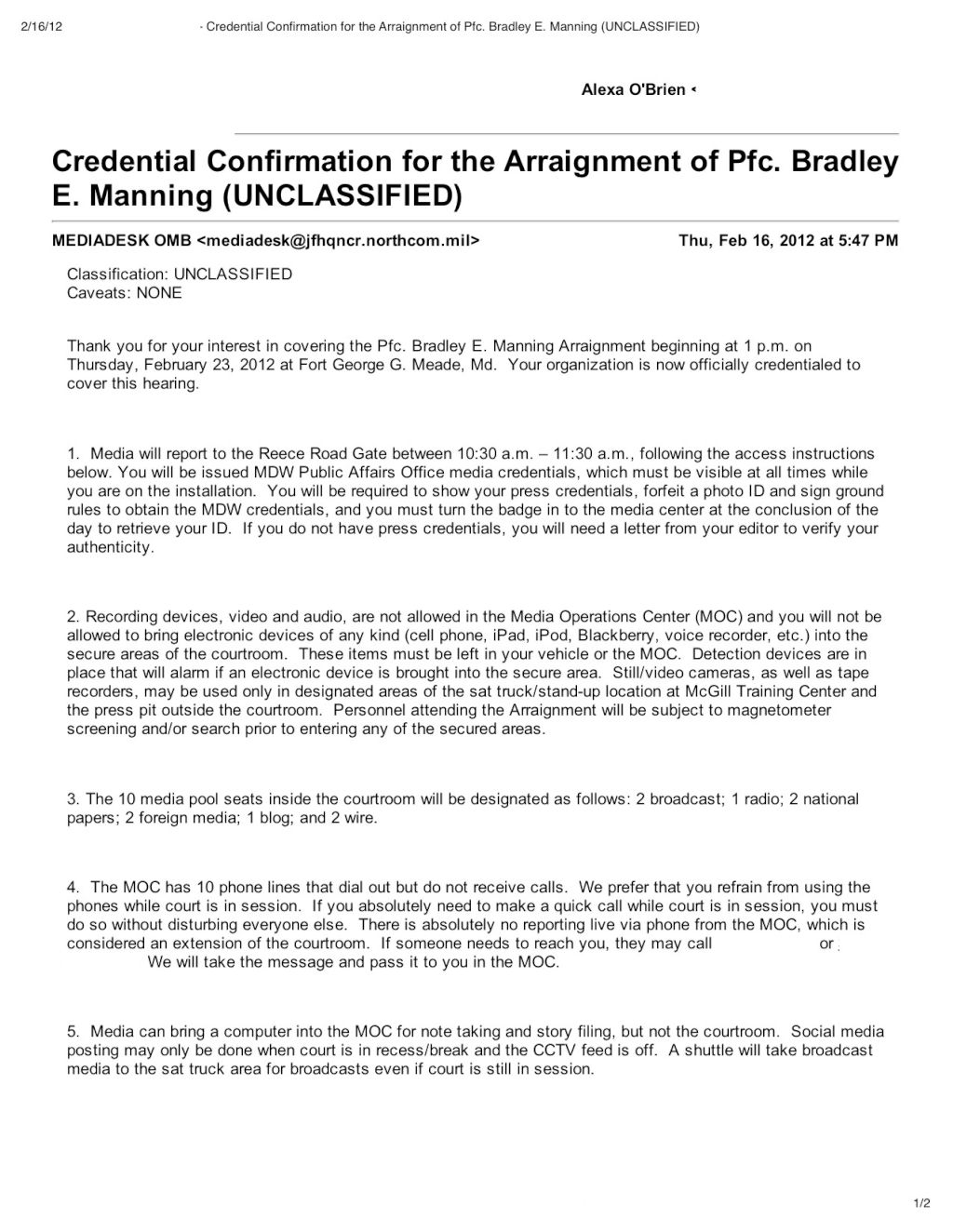
Captain John Haberland, a spokesman for the Military District of Washington (MDW), sat behind me taking notes and coughing. He had also been at the Article 32 Pretrial Hearing. (I would have brought a hearing aid, but, alas, they don't allow electronic devices in courtroom.)
Military judge Col. Denise R. Lind is presiding. She is middle aged, with blondish coiffed hair, spectacles, and a long black robe.
Prosecution is Captain Ashden Fein, Captain Joe Morrow and Captain Angel Overgaard.
Defense is Mr. David Coombs, Major Matthew Kemkes and Captain Paul Bouchard.

Expressen's WikiLeaks' "memo" on Carl Bildt: Rolling Stone magazine from January rollingstone.com/politics/news/… #svpol

The Wikileaks Assange and Democracy Public Forum held at the University of Technology, Sydney on Friday February 17 attracted over 400 people who packed the aisles and spilled out into the corridors.
Chaired by Australian journalist and broadcaster Mary Kostakidis, speakers at the forum included socialist historian Humphrey McQueen, Greens Senator Scott Ludlum, London-based human rights lawyer Jennifer Robinson and Christine Assange, the mother of Julian Assange.
On February 18 Simon Butler of Green Left Weekly reported on the Forum:
"Veteran journalist and former SBS broadcaster Mary Kostakidis chaired the meeting. She told the audience WikiLeaks had won several prestigious awards for excellence in journalism. She said the US government is persecuting WikiLeaks for publishing material that other media outlets have also published. The difference was that WikiLeaks has done it better, she said.
McQueen gave historical examples of how ruling elites have always tried to restrict the public’s access to information, lest they learn enough to want to challenge the social order. He said WikiLeaks’ revelations are dangerous to elite interests because they help educate people about the real nature of society.
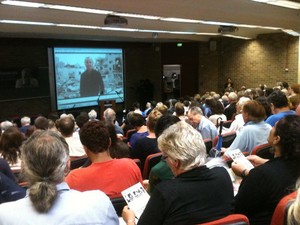
Ludlum said he was pleased with the big turnout and denounced the Labor government’s attacks on WikiLeaks and Assange. He urged WikiLeaks supporters to put the pressure on the government to choose democracy and freedom of speech over the US-Australia alliance.
The investigation, which had been active since 2008, has been moved from Warsaw to Krakow, several Polish news outlets report. According to Piotr Kosmaty, the spokesperson of the Prokuratura Apelacyjna Krakow, the case files have already arrived. He declined to comment on the reasons behind the transfer.
This is not the first unexpected development in this investigation. Earlier last year, Warsaw prosecutor Jerzy Mierzewski was removed from the case, after it emerged that he had planned to file charges. His case files were subsequently obtained by daily newspaper Gazeta Wyborcza. In turn, Gdansk prosecutors opened an investigation into this leak.
Gazeta Wyborcza state that Mierzewski had evidence proving the existence of an extraterritorial US area in breach of the Polish constitution and of international law; moreover it proved that those kept in this area qualified as victims of war crimes and crimes against humanity.
See this link for our previous coverage.
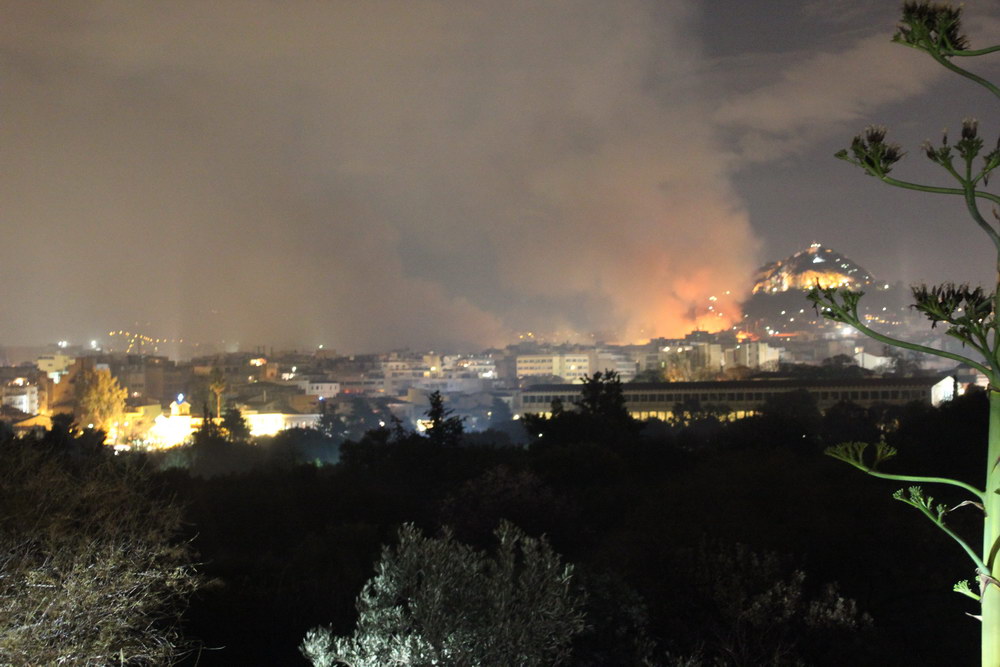
(Photo by Real Democracy GR – MultiMedia Team )
Greece’s political establishment trembles as banks and government offices burn amid violent anti-austerity riots. Has the country finally reached a tipping point?
Exactly ten years ago, the crisis-ridden country of Argentina spiraled into a bout of social unrest that would eventually lead to the largest sovereign default in history. After three years of being forced to swallow the bitter pill of IMF-imposed austerity, a tipping point was finally reached: foreign creditors and neoliberal governments had pushed the people too far. They rose up in defiance and ousted five successive Presidents in the space of just three weeks.
With the incredible images of flame-engulfed buildings and policemen emerging out of Athens, it now looks like Greece may be headed down the same path. The country has become ungovernable. Even though a majority of traitors was found to pass yet another deeply unpopular austerity package through Parliament, this weekend’s violent protests indicate that the ‘Argentina moment’ may have arrived. The Greek people simply can’t take any more austerity.
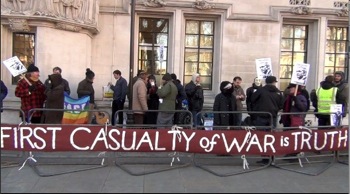 During the second and final day of the U.K. Supreme Court's hearings on Julian Assange's extradition, Matrix Chambers attorney Clare Montgomery offered her rebuttal to arguments made yesterday by Assange's counsel. (Dinah Rose is representing Assange in his fight against extradition to Sweden for questioning on sex crime allegations.)
During the second and final day of the U.K. Supreme Court's hearings on Julian Assange's extradition, Matrix Chambers attorney Clare Montgomery offered her rebuttal to arguments made yesterday by Assange's counsel. (Dinah Rose is representing Assange in his fight against extradition to Sweden for questioning on sex crime allegations.)
The week's proceedings have highlighted disparities of law among EU countries and the legal challenges involved in reconciling these conflicts. Assange's case may test the extent to which EU nations can maintain their legal autonomy under the rubric of a unified European system. It may also raise the question: to what degree will EU states have to harmonize their conflicting legal regimes in order to avoid this sort of continued legal wrangling in the future?
Montgomery presented Sweden's case against Assange for about four hours, during which time she appeared to reject EU-wide legal standardization -- essentially arguing that respecting state sovereignty requires preserving the status quo. If it agreed with Montgomery's position, the Court would have to accept significant differences among EU nations in implementing EU-wide legal standards. By contrast, Assange's legal team largely took the position that, while allowing for some variation and inconsistency, the Court should mandate certain universal principles in the extradition process, because of the seriousness of the potential risk that extradition may pose to individual rights.
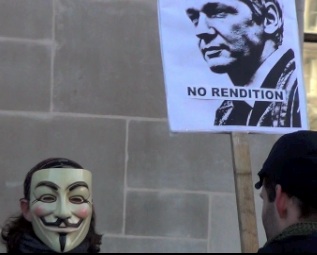 At Day 1 of the Julian Assange extradition hearing
At Day 1 of the Julian Assange extradition hearing
On the night before the hearing began, one dedicated Assange supporter in London told me that she planned to arrive at Court by 6 a.m., ahead of the throngs that she expected based on the turnout at Assange's hearing last November. No doubt the freezing February temperatures kept large crowds at home this morning; instead of the masses anticipated, there were only a few orderly lines segregated into cameramen, sign-wielding protesters, and the courtroom audience -- a mix of media representatives, Assange faithfuls, and the curious. I was in the latter line, which was also peppered with a few Occupy London luminaries. During the next hour of collective shivering, I met journalists from all over Europe and the U.S., who now braved frigid weather to witness this historic proceeding. Arriving at around 8:30, one hour before the Court opened to the public, I witnessed the expectant crowd devolve into a chorus of complaints as the early-morning, late-winter wind chill robbed our fingers of almost all feeling.
But, mercifully, 9:30 at last arrived -- as did Assange, soon after. The white-haired WikiLeaks founder offered a spirited hello to the crowd and preceded us into the Court.
At the entry, Court staff had handed out a media briefing, which included the following details:
"Issue: Whether a European Arrest Warrant ('EAW') issued by a public prosecutor is a valid Part I EAW issued by a 'judicial authority' for the purpose and within the meaning of sections 2 and 66 of the Extradition Act 2003.
Theme by Danetsoft and Danang Probo Sayekti inspired by Maksimer